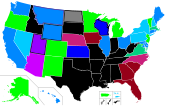History
Legislative history
The state was one of 10 states in 2007 to have a customary informed consent provision for abortions. [9] In 2013, state Targeted Regulation of Abortion Providers (TRAP) had provisions related to admitting privileges and licensing. They required clinics have hospital privileges and transfer agreement with a hospital. [10]
In 2015 Tennessee established a required 48 hour waiting period before obtaining an abortion. [11]
The state legislature was one of eight states nationwide that tried, and failed, to pass a bill to ban early abortion in 2017. [12] They tried again in 2018, where they were one of ten states that tried and failed to pass a fetal heartbeat bill. [12] Two fetal heartbeat bills were filed in the Tennessee General Assembly in 2019. On January 23, 2019, Rep. James "Micah" Van Huss filed HB 77 in the Tennessee House of Representatives. [13] On February 7, 2019, Sen. Mark Pody filed SB 1236 in the Tennessee Senate. [14] On February 20, 2019, HB 77 was passed out of a Public Health subcommittee and sent to the full committee. [15] On February 26, 2019, the House Public Health Committee voted 15–4 to send HB 77 to the House floor for a full vote. [16] [17] On February 7, 2019, HB 77 was passed out of the Tennessee House by a vote of 66–21. [18] As of May 14, 2019, the state prohibited abortions after the fetus was viable, generally at some point between weeks 24 and 28. This period uses a standard defined by the US Supreme Court in 1973 with the Roe v. Wade ruling and was not a result of state-based legislation. [12] In 2020 Tennessee banned abortions because of a prenatal diagnosis of Down syndrome or because of the gender or race of the fetus. [19]
Due to the trigger law prohibiting abortion from the point of fertilization which was adopted on April 22, 2019, abortion became illegal from the point of conception in Tennessee on July 25, 2022, 30 days after the overturning of Roe v. Wade . [20]
Judicial history
The US Supreme Court's decision in 1973's Roe v. Wade ruling meant the state could no longer regulate abortion in the first trimester. [21] (However, the Supreme Court overturned Roe v. Wade in Dobbs v. Jackson Women's Health Organization , No. 19-1392 , 597 U.S. ___(2022) later in 2022. [22] [23] )
Tennessee's heartbeat bill and the Texas-style abortion ban have been in court due to pro-abortion rights organizations suing the state of Tennessee. [24]

On September 12, 2023, three women filed a lawsuit against the state of Tennessee over the state's abortion ban, stating that they were denied abortions despite having dangerous pregnancy complications. [25] On January 8, 2024, four additional women and two doctors joined the lawsuit. [26]
In October 2024, a Tennessee court blocked enforcement of the abortion ban in certain emergencies, ruling that the medical emergency exception in Tennessee's abortion ban was unclear and violated a pregnant individual's right to life under the Tennessee state constitution. The preliminary order said that abortion must be allowed if a pregnant patient's water breaks too early, the cervix dilates before the fetus is viable, or if a fetus has a fatal diagnosis that threatens the pregnant patient's health. It barred the state from disciplining doctors who performed abortions under those circumstances. [27]
Clinic history
Between 1982 and 1992, the number of abortion clinics in the state declined by 47, going from 128 in 1982 to 33 in 1992. [28] In 2014, there were seven abortion clinics in the state. [29] In 2014, 96% of the counties in the state did not have an abortion clinic. That year, 63% of women in the state aged 15–44 lived in a county without an abortion clinic. [30] In 2017, there were four Planned Parenthood clinics, all of which offered abortion services, in a state with a population of 1,519,130 women aged 15–49. [31]
Municipal actions
On July 13, 2022, the Memphis City council passed the Reproductive Autonomy is Necessary (RAIN) Act in an effort to lessen the extent to which statewide policy will affect childbearing women in Memphis. [32]
Polling
In a 2014 poll by the Pew Research Center, 55% of adults in Tennessee said that abortion should be illegal in all or most cases and 40% said it should be legal. [33] By 2022, support for legal abortion in the state had greatly increased.
| Political affiliation | Legal in all cases | Legal only in special cases [a] | Illegal in all cases |
|---|---|---|---|
| Democratic | 70% | 22% | 6% |
| Republican | 8% | 54% | 33% |
| Independent | 38% | 46% | 12% |
| Total | 36% | 44% | 17% |


